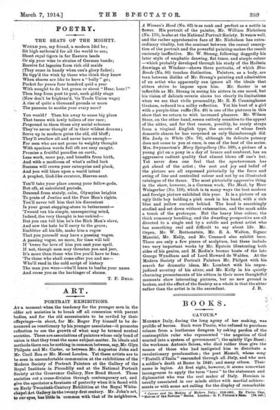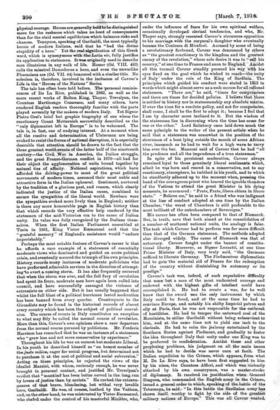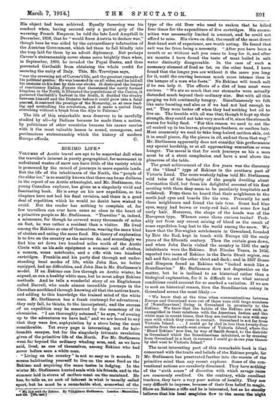BOOKS.
°AYOUB" MODERN Italy, during the long agony of her making, was prolific of heroes. Such were Poerio, who refused to purchase release from a loathsome dungeon by asking pardon of the contemptible ruler who represented "the !legation of God erected into a system of government"; the saintly Ugo Bassi ; the workman Antonio Sciesa, who died rather than give the names of those who had instigated him to distribute a revolutionary proclamation ; the poet Mameli, whose song "Fratelli d'Italia" resounded through all-Italy, and who met a soldier's death at Rome in 1849; and many others. Their name is legion. At first sight, however, it seems somewhat incongruous to apply the term " hero " to the statesman and diplomatist who was the real maker of Italy. Heroism ie usually associated in our minds either with martial achieve- ment° or with some act calling for the display of remarkable
• Censer and the Natio of Modern Daly 18101111. By, Pietro Doi. "Heroes of the Nations " Series. London G. P. Pataases Sam. VW nal
physical courage. Heroes are generally heldto be distinguished more for the rashness which takes no heed of consequences than for the staid mental equilibrium which balances risks and chances. Tennyson, speaking of Garibaldi, the most typically heroic of modern Italians, aaid that he "had the divine stupidity of a hero." Yet the realaignification of this Greek word, which is synonymous with. theaatin tdr, fully justifies its application to statesmen. It was originally used to describe men illustrious in any walk of life. Homer (Od. VI1L 483) calls the minstrel Demodocaa a hero, and even the unwarlike Plureacians are (0d. VII. 44) honoured with a similar title. No solecism is, therefore, involved in. the inclusion of Cavour's Life in the " Heroea of the Nations" Series.
The tale has often been told before. The personal reminis- cences of De La. Rive, published. in 1862, as well as the more recent works of Bolton King, Thayer, Trevelyan, the Countess Martinengo Cesaresco, and many others, have rendered English readers thoroughly familiar with the parts played severally by the makers of modern Italy. Yet Signor Pietro Oral's brief but graphio biography of one whom the reactionary Count Metternich sorrowfully described as the "only diplomatist left in Europe" is to be welcomed. The tale is, in fast, one of undying interest. At a moment when all the resolve and determination of Ulstermen are being evoked to resist the forces of national disruption, it is especially desirable that attention should be drawn to the fact that the three greatest world-events of the latter half of the nineteenth century—the Civil War in America, the Italian struggle, and the great Franoo-German conflict in 1870—all had for their object the agglomeration of unite, bound together by natural ties of affinity. National aspirations, which have afforded the driving-power to most of the great political movements of modern times, assumed their most noble and attractive form in the Italian upheaval. Sentiment, nurtured by the tradition of a glorious past, and reason, which clearly indicated the justice of the Italian cause, combined to secure the sympathies of the liberal world. Nowhere were the, sympathies evoked more lively than in England; neither is there any more honourable page in English history than that which records the very effective help rendered by the statesmen of the mid-Victorian era to the cause of Italian unity. Its value was fully recognized by the Italians them- selves. When the first Italian Parliament assembled at Turin in 1861,. King Victor Emmanuel said that the " grateful memory" of England's assistance would "endure imperishably." Perhaps the most notable feature of Cavour's career is that he affords a rare example of a. statesman of essentially moderate views who. dominated and guided an acute political crisis, and eventually secured the triumph. of his own principles. History, records many instances of moderate politicians who have performed admirable services in the direction of attempt.- ingto avert a coming storm. It has also frequently occurred that when the storm was over, and the full fury of revolution had spent its force, moderate men have again been called into council, and have successfully assuaged the violence of extremists on either side. But it has usually happened that whilst the full blast of a political hurricane lasted moderation has been banned from every quarter. Counterparts to the Girondists may be found in the historical records of almost every country whichams been the subject of political convul- sion. The course of events in Italy constitutes an exception to what may fitly be called the normal course of revolution. More than this, Cavour's own opinions show a rare. departure from the normal course pursued by politicians. Mr. Frederic Harrison has remarked that he was an instance of a statesman who " grew less and not more conservative by experience." Throughout his life he was an earnest but moderate LiberaL In his youth he described himself as "an honest member of the juste milieu, eager for social progress, but determined not to purchase it at the cost of political and social subversion." Acting on these principles, he rejected the views of the idealist mumni, with whom, curiously enough, he was never brought in personal contact, and justified Mr. Trevelyan's verdict that "mankind has been better served in the long run by lovers of justice than by zealots." He curbed the. extrava- gances of that brave, bluudering, but withal very lovable hero, Garibaldi. He was, of course, loathed by the Vatican, and, on the other-hand, he was mistrusted by Victor Emmanuel, who chafed under the control of his masterful Milliliter, who, under the influence of fears for his own spiritual welfare, Occasionally developed clerical tendencies, and who, Mr. Thayer says, strongly resented- Cavour's strenuous opposition to his marriage with the corporal's daughter who eventually became the.Contessa di Mirafiori. Accused by some of being a revolutionary firebrand, Cavour was denounced by others as " the greatest reactionary in the kingdom and the greatest enemy of the revolution," whose sole desire it was to "sell his country," atone time to France and anon to England. AMidat all this turmoil Cavour steadily pursued his way with his eyes fixed on the goal which be wished to reach—the unity of Italy" under the rule of the King of Sardinia. The principles which guided his conduct were stated in 1852 in words which might almost serve as a made mecum for all rational statesmen. "There are," he said, "times for compromises and there are times for decided policies. I believe that there is neither= in history nor in statesmanship any absolute maxim. If ever the time for a resolute policy. and not for comproinise, shall come, I shall he the first to adopt it; because I feel that I am by character more inclined to it. But the wisdom of the statesman lies in discerning when the time has come for one or the other." Lord Salisbury once laid down much the same principle to the writer of the present article- when he said that a statesman was somewhat in the position of the steersman of a boat lying outside the mouth of some African river, inasmuch as he had to wait for a high wave to carry him over the bar. Manzoni said of Cavour that he had "all the prudence and all the imprudence of a true statesman." In spite, of his persistent moderation, Cavour always remained loyal to those genuinely liberal sentiments which, albeit he was born and reared in a conservative, not to say reactionary, atmosphere, he imbibed in his youth, and to which he steadfastly adhered up to the moment when, pressing the hand of the courageous priest who braved the ignoble thunders of the Vatican to attend the great Minister in his dying moments, he murmured " Fmte, Frate, libera chiesa in fiber° state," " Believe me," he said to a friend who was indignant at the line of conduct, adopted at one time by the Italian Chamber, "the worst of Chambers is still preferable to the most brilliant of the antechambers of Sovereigns."
His career has often been compared to that of Bismarck. But, in truth, save that both aimed at the consolidation of a number. of scattered national units, the analogy is false. The task which Cavour had to perform was far more difficult than that of the German statesman. The methods adopted also diverged widely. The cause of Bismarck was that of autocracy. Cavour fought under the banner of constitu- tional liberty. Moreover, as Signor Luzzatti, at one time Prime Minister of Italy, very truly said, " the Germans sufficed to liberate Germany. The Piedmontese diplomatists had to gain-the material aid of France for the redemption of the country without diminishing its autonomy or its prestige."
Cavour's task wart, indeed, of such superlative- diffibulty that none' but a man of the most undaunted courage and endowed with _ the- highest gifts- of intellect could have accomplished it. He had to create a ' war, for he well knew that the sword was the only instrument by which Italy could be freed, and at the same time he had to convince Europe, and_ notably his. shifty Imperial patron and ally at Paris, that he was not responsible for the outbreak of hostilities. He had to temper the untoward zeal of the Mazzinists, to utilize Garibaldi without being subservient to him, and at the same time not to yield one inch to the clericals. He had to calm the jealousy entertained by the Southern States against Piedmont, and gradually to foster the idea throughout Italy that unity under one King was to be preferred to confederation. Amidst these and other perplexing problems, his judgment on all the main issues which he had to decide was never once, at fault. The Italian expedition to the Crimea, which appears, frbm. what M. De La Rive says, to have been first suggested to him by his niece, the Countess- Alfieri, and which was violently attacked by his own countrymen, was a master-stroke of diplomacy. It received its justification when General Simpson, who commanded the English army in the Crimea, issued a general order in which, speaking of the battle of the Tchernaya, he said: "In this battle the Sardinian army has shown itself worthy to fight by the side of the greatest military nations of Europe." This was all Carom. wanted. His object 'had been achieved. Equally farseeing was his conduct when, having secured only a partial grip of the wavering French Emperor, be told the late Lord Amptbill in December, 1858, that he " would force Austria to declare war," though here he was aided by the extraordinary infatuation of the Austrian Government, which led them to fall blindly into the trap laid for them by an adroit diplomacy. But perhaps GaveWs statesmanship never shone more brightly than when, in September, 1860, be invaded the Papal States, and thus prevented Garibaldi from obtaining the -whole credit for securing the unity of Italy. This, Mr. Trevelyan says, "was the crowning ad of Cavcrarl life, and.the greatest example of his political genius.. Howse henieff ed M. on all sides; and be laid all his ensmiaSathisfeet by this one stroke. a destroyed the league of reactionary Hansa Dowers that threatened the newly formed kingdom in the North; it liberated the popidations of the Centre, it garnered Garibaldi's' Haired- in the South, it decided`the rivalry between. himself and the Dictator before it could grow into a fatal quarrel, it restored the prestige of the Monarchy, as at once lead- ing apd cfmtrmling the revolution, and it made a united Italy stretching without a break from the Alps to Palermo."
The life of bhiereniarkable man deserves to be carefully atudied by all—by Italians because he made them a nation, by politicians of other countries because his career carries with it the most valuable lesson in sound, courageous, and pertinacious statesmanship which the history of modern
















































 Previous page
Previous page